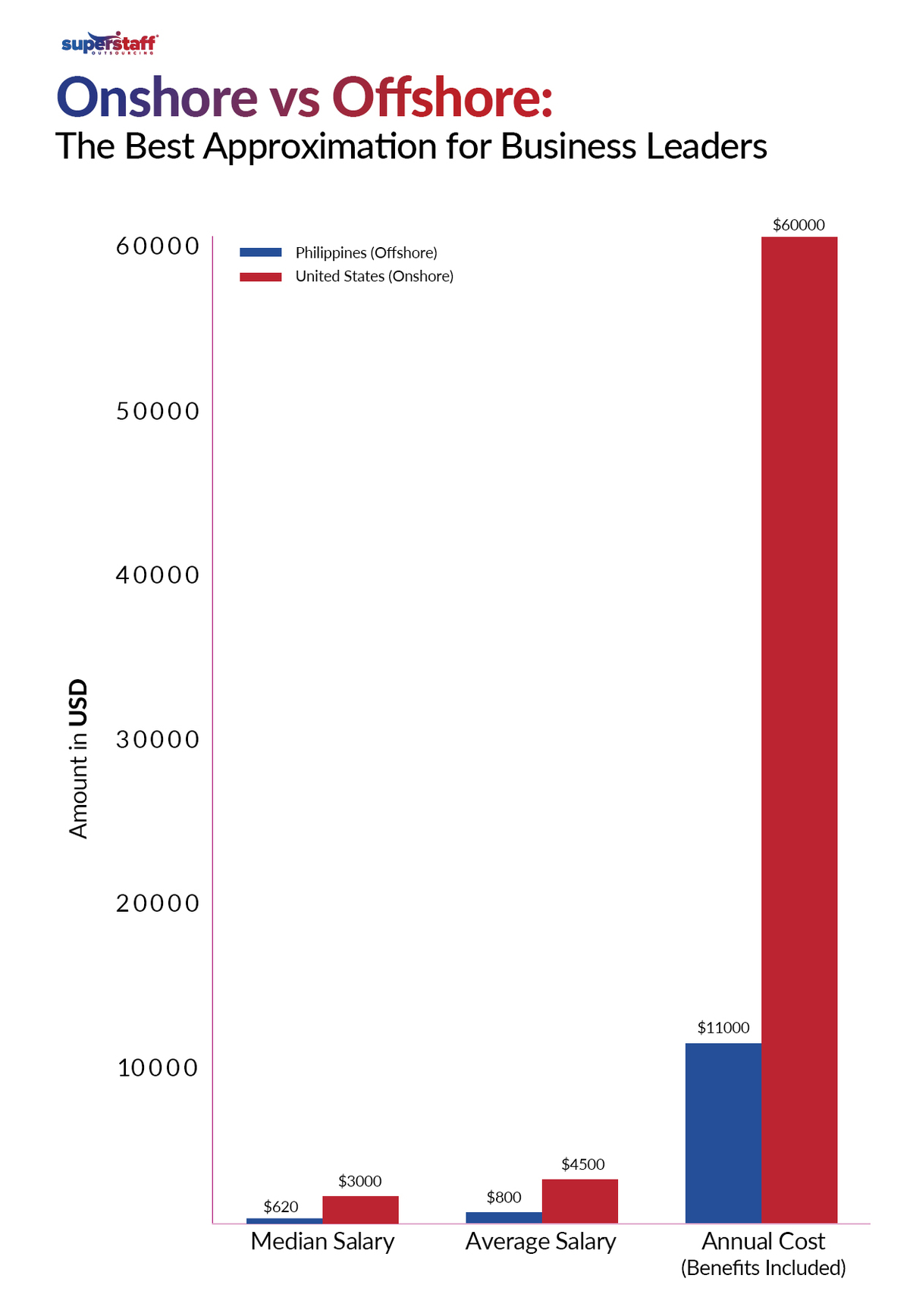
Cutting your expenses by 60% might sound too good to be true, but outsourcing to the Philippines can make it achievable.
Our comprehensive breakdown reveals how leveraging Filipino talent translates into substantial cost savings. We will explore salary structures, infrastructure costs, and operational efficiencies, demonstrating why the Philippines is a leading offshore outsourcing destination.
It’s important to note that wages are lower in the Philippines due to the country’s lower cost of living and reduced commercial rental expenses compared to the U.S. Nevertheless, the Philippine BPO industry stands out for offering premium wages.
Even as we emphasize cost-effective salaries, your offshore employees will be receiving competitive — often above-market — compensation by Philippine standards. This balance ensures you benefit from reduced costs while maintaining a high level of employee satisfaction and performance.
The Philippines’ Labor Market
When companies consider outsourcing to the Philippines, cost-effectiveness is often the top priority — and for good reason. A recent salary benchmarking study provides a deeper look at the numbers. Based on data from 101,375 active employees, the average salary is ₱37,372.12, with a median income of ₱25,000. Managers top the scale with an average wage of ₱78,382.78, followed by officers earning ₱49,060.64 and rank-and-file employees at ₱29,005.74.
Focusing specifically on the BPO industry, here are the numbers:
- Information Technology
Median Salary: ₱33,000
Average Salary: ₱51,088.31 - Outsourcing/Offshoring Roles
Median Salary: ₱35,000
Average Salary: ₱45,157.46
Now let’s move the conversation forward.
In the next section, we will directly compare onshore and offshore hiring, focusing on the significant labor cost differences between the Philippines and the U.S. This analysis will illustrate why offshore hiring offers competitive advantages and long-term sustainability for your business.

Onshore vs. Offshore Hiring
Labor costs are consistently one of the most compelling reasons for outsourcing. Whether you’re a startup seeking leaner operations or an established enterprise aiming to optimize expenditures, reducing labor costs without compromising quality is the ideal scenario. The financial benefits of offshoring to the Philippines are clear and significant, offering businesses a substantial cost advantage compared to onshore hiring in the U.S.
To provide a clearer perspective, here’s a detailed cost breakdown illustrating how much your business can save by leveraging the Philippines’ outsourcing model.
Labor Costs
- Philippines:
- Median Salary (Outsourcing/Offshoring roles): ₱35,000.00 (approx. $620/month)
- Average Salary: ₱45,157.46 (approx. $800/month)
- Annual Cost (Including Benefits): Around $10,000 – $12,000 per employee.
- U.S.:
- Median Salary (Customer Service Reps): $3,000 /month depending on region.
- Average Salary: $4,500/month, depending on the region.
- Annual Cost (Including Benefits): $50,000 – $70,000 per employee.
The numbers speak for themselves, making a compelling case for offshoring to the Philippines. With the country’s BPO sector providing up to a 60% reduction in costs compared to U.S.-based operations, businesses stand to unlock significant capital savings. However, the cost advantage of the Philippines extends beyond just salaries. By outsourcing, companies can not only save on labor but also gain efficiencies in other critical areas of operation.
Now, let’s shift focus from labor cost savings to another essential business expense: infrastructure.
Infrastructure Sample Cost Analysis
While labor costs often dominate discussions around business expenses, infrastructure costs account for a significant portion of your overhead. To truly understand the full cost-saving potential of offshoring, comparing infrastructure expenses between the Philippines and the U.S. is essential. In this comparison, the Philippines is a highly cost-effective option for businesses looking to optimize their operational budgets.
Below is a detailed breakdown of crucial infrastructure costs to consider when evaluating offshoring opportunities in the Philippines versus maintaining operations in the U.S.
Infrastructure Costs
- Philippines:
- BPOs often provide fully equipped office spaces, reducing additional infrastructure investments.
- Power and internet reliability can sometimes be a concern, but they are improving, particularly in major cities like Manila and Cebu.
- U.S.:
- Higher real estate and utility costs, especially in urban areas.
- Companies may need to invest in infrastructure and technology if managing in-house teams.
In this scenario, we assume the BPO covers most infrastructure costs (e.g., office space, internet, utilities), and the company pays an all-inclusive service fee.
Philippines
The average infrastructure fee in BPO pricing can range from $300 – $500 per seat per month.
- Monthly Cost per Seat (for infrastructure, utilities, equipment, etc.): $400
- Number of Employees: 50
- Total Monthly Cost: $400 * 50 = $20,000
Annual Infrastructure Cost:
$20,000 * 12 = $240,000
U.S. (In-House Operations)
In this scenario, the company sets up and manages its infrastructure for an in-house team. Costs include rent, utilities, and equipment setup.
1. Office Space Rental
- Cost per square foot (in urban areas like New York or San Francisco): Approx. $50/sq. ft. annually
- Space Required per Employee: 150 sq. ft. per employee
- Total Square Footage: 50 employees * 150 sq. ft. = 7,500 sq. ft.
Annual Rent:
7,500 sq. ft. * $50 = $375,000/year
2. Utilities & Internet
- Monthly Utility Costs (Electricity, Water, Internet): $1,000
- Total Annual Utility Costs: $1,000 * 12 = $12,000/year
3. Equipment Costs (one-time setup)
- Cost per Workstation (Desk, Computer, Phone, Misc.): $2,500
- Total Equipment Cost: 50 employees * $2,500 = $125,000 (one-time)
U.S. Total Costs
- Annual Rent: $375,000
- Annual Utilities & Internet: $12,000
- One-Time Equipment Cost: $125,000 (first year only)
Total First-Year Infrastructure Cost:
$375,000 + $12,000 + $125,000 = $512,000
Cost Comparison Summary:
- Philippines (BPO Model): $240,000 per year
- U.S. (In-House Model): $512,000 (first year), and $387,000 (from the second year onward, excluding equipment costs).

Next, we’ll explore how outsourcing to the Philippines can continue to drive profitability by significantly reducing your overhead expenses.
Streamlining Overhead: How Outsourcing to the Philippines Can Slash Your Operational Costs
When you factor in operational expenses such as taxes, legal compliance, and employee benefits, the Philippines once again proves its value. As the world’s Call Center Capital, the Philippines has become a prime destination for companies looking to streamline operations and redirect resources toward growth. Let’s break down why this outsourcing hub offers a strategic advantage in managing operational costs.
Operational Costs Comparison:
- Philippines:
- Lower corporate taxes and simplified regulatory requirements for foreign companies partnering with BPOs.
- Employee benefits and perks are often more affordable, with many BPOs taking on the responsibility of payroll, HR, and legal compliance, minimizing the administrative burden on your business.
- U.S.:
- Higher corporate and payroll taxes, coupled with more complex compliance requirements related to labor laws.
- Managing health benefits, retirement plans, and other perks is significantly more expensive, adding layers of cost to your operations.
Outsourcing to the Philippines allows foreign businesses to avoid many administrative and legal complexities in the U.S., resulting in substantial cost reductions. For companies aiming to balance cost savings with quality service, partnering with a Philippine-based BPO is a more financially sound choice than hiring domestically.
By tapping into the expertise of the Philippine BPO industry, companies can realize impressive cost savings and streamline their operational complexities. This strategic move enables businesses to focus on their core competencies — growing their business — while skilled offshore teams manage customer support and back-office functions. If you’re considering outsourcing to the Philippines, now is the perfect time to seize this opportunity.
Outsourcing to the Philippines: A Proven Strategy for Cost Efficiency
With a strong foothold in the Philippines, SuperStaff offers the perfect blend of local expertise and industry know-how, delivering tailored outsourcing solutions that align seamlessly with your business goals.
Whether your needs are in customer service or back-office support, we specialize in crafting customized experiences that ensure operational efficiency and effectiveness. Our use of advanced technology and a proactive approach to problem-solving guarantees that your operations are positioned for success.
Experience the SuperStaff advantage and watch your business thrive in today’s competitive landscape!






